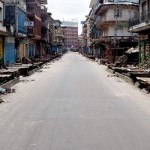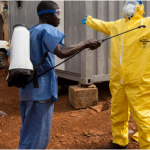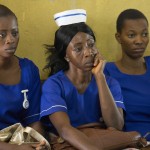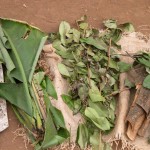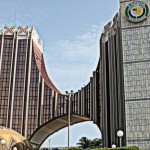For Donald Kaberuka, ex-President of the African Development Bank (AfDB), the Ebola epidemic confirmed his belief that war and instability had left the Mano River countries (Guinea, Côte d’Ivoire, Sierra Leone and Liberia) too weak to handle a serious crisis. Speaking at his last AfDB annual meeting as president, in Abidjan, Kaberuka said that the responses to the epidemic marked out these so-called “fragile” states from their neighbours.
“Months before the Ebola outbreak, we had been working with these countries through the Mano River Special Programme to rebuild their institutions. We must never abandon those programmes,” Kaberuka told delegates at the May 27th launch of the AfDB and World Bank’s joint programme to support post-Ebola recovery in the affected countries. Assisting post-conflict and fragile states has become a personal mission for the AfDB’s departing head, who served as Rwanda’s minister of finance after its catastrophic war and genocide in the 1990s.
“The solution to the Ebola crisis is not a vertical response – just to improve primary health care – the solution is to deal also with education, water supply and all the other basics that they lack. I am not a medical man, but I can say that otherwise we are treating these countries’ symptoms, not their disease, which is the fragility of these countries,” said Kaberuka.
“We must raise funds vertically but spend it horizontally,” he added, turning to another of his favourite themes: the mismatch between the way donor funding has to be raised and the way it needs to be spent. There are funds for education, funds for prevention of malaria or HIV, but fragile states need help across the spectrum.
Makhtar Diop, head of Africa at the World Bank, emphasised that the response also needs to be incremental. “My priority is to link the post-Ebola recovery programme to the programmes we already had in place for Guinea, Sierra Leone and Liberia before the epidemic,” he said. “I’ve made it clear that new funds for these countries after the epidemic are a supplement, not a substitute for the existing programmes. There is a deficit in health spending in these states equivalent to 3% to 4% of their total budget.”
Diop outlined the priorities for preventing or combating further epidemics. The first is a regional protocol for intervention to avoid a repetition of the inaction and denial that followed the initial outbreak; secondly, a system of training health workers and auxiliaries; and finally a properly funded system to ensure that communities and villages are organised and prepared to prevent infectious and deadly diseases. “When I grew up in Senegal, people took steps at the local level to prevent disease, this is no longer happening and it has to be done in future,” said Diop.
Diop issued a reminder to the assembled officials that “African governments were elected to govern, it is their responsibility to ensure that these things happen. It’s not just a question of money, you also need the will and the human capacity to achieve them”.
The government in Côte d’Ivoire seems to have understood this point from the outset. “We are bordering two countries that had the Ebola epidemic and also Mali, where there was a brief outbreak, but we got no help from the outside world initially,” explained Dr Raymonde Goudou Coffie, the Ivoirian minister of health. “We were told that we didn’t have Ebola so we’d get no help.”
“We decided early what needed to be done,” Dr Coffie continued. “Firstly, we recognised the problem, we didn’t deny Ebola’s existence or its threat. Then we made sure the medical profession were able to diagnose and react to any outbreak, and thirdly we communicated with the other countries in the region.” The rapid initial response was crucially important in preventing an epidemic in Côte d’Ivoire. Later, Coffie acknowledged, the World Bank and AfDB did provide “substantial financial aid”.
Kaberuka had the final word, declaring that “communication during the Ebola crisis was a disaster”. In his view, the only way to co-ordinate the handling of similar future outbreaks on the continent is to have a “World Health Organization for Africa.”
Paul Adams is the author of “Bank to the Future” and was in Abidjan for the AfDB General Meeting







